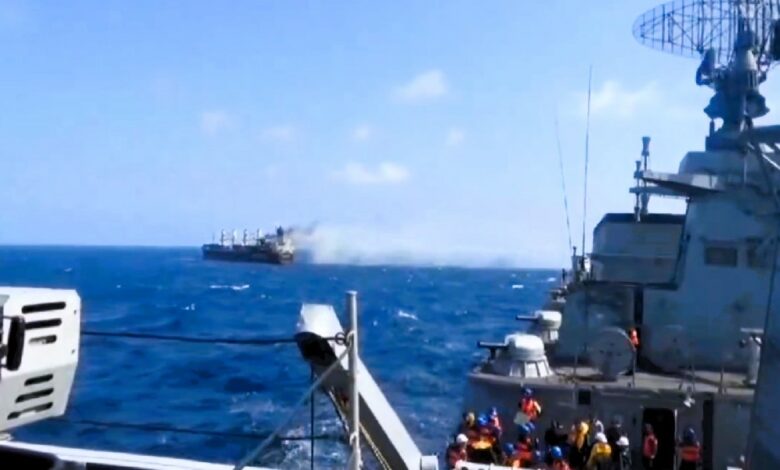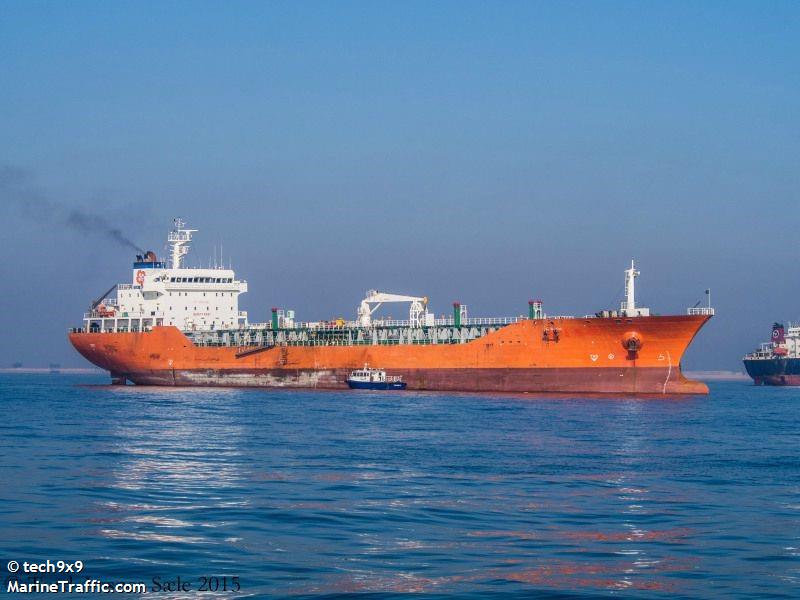Shipping mourns first deaths from Red Sea crisis

Top officials from across the shipping industry have expressed their feelings about the first loss of lives from the five-month old Red Sea shipping crisis.
The Houthis fired a missile yesterday at the True Confidence, a 13-year-old, 50,448 dwt bulk carrier, which struck near the stern of the vessel. Three crew – a Vietnamese and two Filipinos – died, and two more were severely injured and are in hospital.
The Indian navy assisted in rescuing the crew who had abandoned the ship, as well in dousing the blaze on the Barbados-flagged ship, which had recently been sold by Oaktree to Greek interests. Its links to American interests – as highlighted by the Houthis yesterday – came to an end last month.
How can murdering these innocent seafarers possibly be justified?
True Confidence was on passage from China to Jeddah and Aqaba with a cargo of steel products and trucks.
The vessel is owned by True Confidence Shipping and operated by Third January Maritime of Piraeus. The vessel is drifting well away from land and salvage arrangements are being made. Sources linked to the ship told Splash today that the ship’s superstructure is very badly damaged, but the vessel is towable and the Indian navy is coordinating with a salvage team to protect a tug coming in to move the stricken ship.
International Maritime Organization secretary-general Arsenio Dominguez said it was “deeply saddening” to follow the “horrific” reports of the casualties on the True Confidence.
“Innocent seafarers should never become collateral victims,” Dominguez said, while calling for collective action to fortify the safety of those who serve at sea.
“International trade depends on international shipping and international shipping cannot go on without seafarers,” Dominguez stressed.
Stephen Cotton, general secretary of the International Transport Workers’ Federation (ITF), a seafarers union, called for urgent action to protect its members.
“We have consistently warned the international community and the maritime industry about the escalating risks faced by seafarers in the Gulf of Aden and Red Sea. Today … we see those warnings tragically confirmed,” Cotton said yesterday.
Commenting on social media, Budd Darr, executive vice president at Mediterrnean Shipping Co (MSC), responsible for maritime policy and government affairs at the world’s largest containerline, hit out at the Houthis.
“It is hard to see in any context how murdering these innocent seafarers in the Gulf of Aden could possibly be justified,” Darr wrote.
In a joint statement issued today, leading shipping organisations including INTERTANKO, INTERCARGO, BIMCO and the International Chamber of Shipping urged: “The frequency of attacks on merchant shipping highlights the urgent need for all stakeholders to take decisive action to safeguard the lives of innocent civilian seafarers and put an end to such threats.”
In a social media post, InterManager, the global association for shipmanagers, stated that the “shocking situation” must be addressed by all governments.
“We will call on governments around the world to join us in bringing to a halt these appalling attacks,” White House press secretary Karine Jean-Pierre said yesterday.
More than 60 merchant ships have been targeted by the Iranian-backed Houthis in the five months since Israel went to war with Hamas leading to a massive rerouting of much of the ship traffic between Asia and Europe to take much longer voyages around the continent of Africa.
Over the weekend, the Rubymar bulk carrier became the first constructive total loss of the Red Sea shipping crisis, spewing bunker fuel and risking emitting its cargo of 21,000 tons of fertiliser into the Red Sea.
The anchor of the Rubymar has been cited as the most likely cause of damage to three telecommunications cables in the Red Sea in late February, according to the International Cable Protection Committee, the group representing subsea cable operators.
The Rubymar was hit by ballistic missiles in mid-February off the west coast of Yemen.

 , a 13-year-old, 50,448 dwt bulk carrier, which struck near the stern of the vessel. Three crew – a Vietnamese and two Filipinos – died, and two more were severely injured and are in hospital.
, a 13-year-old, 50,448 dwt bulk carrier, which struck near the stern of the vessel. Three crew – a Vietnamese and two Filipinos – died, and two more were severely injured and are in hospital.
Sure some drastic action have to be taken towards the aggressor.
vessel was under tct to Chinaland Lyg, a Chinese operator. It’d be good to let everybody know that Chinese interests have been hit as well…………
Why are shipping companies continuing to attempt using this route ! Complete disregard for the safety of crews and ships,
maybe the CEO’s should travel with their crews as a show of support.
Crew are numbers cargo are dollars.
Some company are changing this attitude,….slowly.
Mean time mariners paying the price sadly
It’s no different to the 1980s when vessels were getting routinely hit in the PG. No one cares about seafarers, never have and never will.
I remember then, even British family shipping companies, Liverpool based, gave their seafarers no choice and said its go up the gulf or no job. Same situation as now, its nothing new! The CEOs didn’t go onboard then either!
¿After 3 months awaiting a proportionated answer to houthis, now which is the right answer to families, sons, relatives, friends of those sailors killed?
Why alarm! Wasn’t it a matter of time if ships continued going through the area. Did an internacional call go out to stop endangering seafarers lives and advisories to avoid the area? Should an international campaign not have begun to appeal to landlubbers to allow some delays in their precious cargoes, as ships cannot go through the Suez. I am not impressed by this outrage, it was inevitable. For an Industry that talks about safety and risk management, this is no surprise to them so I don’t know the reason for the feigned outrage. Just another example of the disregard for seafarers’ lives.
Iran will continue to say that they have nothing to do with it, but we know that, on the contrary, the regime in Tehran is primarily responsible. And the weaklings of this world will continue to ignore this tumor which continues to grow.
Looks like Operation Prosperity Guardian is failing miserably. Houties proved they have balls unlike diversified tranny western forces. Shipowners now have two choices: go around or negotiate passage with Houties.